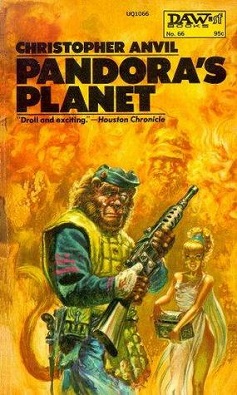
Pandora’s Planet
Christopher Anvil
192 pages
published in 1972 (original in 1956)
Libertarianism has a well deserved bad reputation in science fiction, largely because so many writers who profess to be adherents also are godawful people who write jack off fantasies about how freedom requires their jackbooted thugs putting their boot in somebody else’s face, whether it’s Heinlein’s repeated wish to kill off all the lawyers or Kratman resurrecting the Waffen SS to deal with an alien invasion. But once upon a time there was a gentler, more humane sort of libertarianism, one that still catered to the prejudices of Analog notorious editor John Campbell Jr, but that hadn’t quite lost its humanity. H. Beam Piper was its best known representative, but there were others, like Christopher Anvil.
Anvil is one of those writers I only ever had heard about, but had never read simply because I’d never seen any of his work for sale, new or secondhand. He was never translated in Dutch as far as I know, one of those minor Analog writers who’d been reasonably popular in the sixties and seventies but was passed by when the genre moved on. From what I gather he specialised in stories in which clever humans put one over militaristic aliens and Pandora’s Planet is in that mold, gently cocking a snoot at authority in general in the process. It’s gentle and not very humourous satire, but much better than the modern libertarian habit of genociding every alien race that looks at Earth funny.
Anvil uses an idea that other writers, like Niven & Pournelle or Harry Turtledove, would later use in more “serious” novels, that of Earth being invaded by aliens who have found the one simple trick of interstellar travel but are actually somewhat dimmer than us earthlings. The Centrans have been conquering star systems for thousands of years, but never had as much trouble as they had with Earth. But while Earth, divided between nations nowhere else seen by them, is able to keep the invaders busy, they can’t win due to the overwhelming numerical supremacy of the Centrans.
For the moment at stalemate, with Earth nominally conquered but the Centrans harassed and harried at every corner, they try a different tactic: don’t conquer, but let the Earthlings be assimilated in the Integral Union. The Centran High Council has thought up this plan because it has been impressed by Earthmen’s intelligence and drive. They however are smart enough to not give the Terrans access to the entire Union, only a part to see if Terran intelligence and drive could help improve the Union, but in such a way that any possible damage would be limited.
So the Earthmen were let loose in the galaxy and chaos reigns on the various Centran colonies they visit and settle on. All which is shown through the eyes of Klide Horsip, the Planetary Integrator who was supposed to have Earth integrated in the Integral Union. Now assigned to keep track of their progress to that part of the Galaxy known to them, Horsip and his righthand man Brak Moffis are firsthand witnesses to what happens if you let communists, fascist dictators and snake oil salesmen loose on an unsuspecting, innocent alien empire…
All of which is fairly dated, mainly satiric riffing on modern life, mid-fifties vintage, but Anvil is an engaging enough writer that you plow through this. What’s more interesting is the sympathetic treatment of the Centrans, which really isn’t an evil empire but seems to follow the same impulses as say the Federation in Star Trek. And while they may not have the same intelligence and drive as Earthmen, they have their own strengths, rather than just being fanatical warriors. Anvil is also smart enough to realise that in group differences in intelligence may very well overshadow differences between groups. In a society as large as the Integral union there will therefore be many Centrans as smart or smarter than humans and best of those are on the High Council because the Centrans don’t waste talent the way Earthmen do.
That’s what sets Pandora’s Planet apart from the flood of other Campbellian adventures where tricksy humans outsmart hidebound aliens. Anvil’s sympathies lie with the Centrans more than with the Earthmen and while the Earthmen do wreak havoc in the Union, it doesn’t get nasty. An entertaining if ultimately shallow read.
No Comments